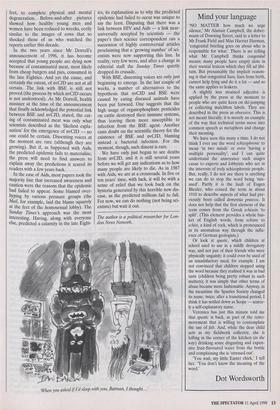Mind your language
`NO MATTER how much we urge silence,' Mr Alastair Campbell, the dober- mann of Downing Street, said in a letter to Mr Frank Field and Miss Harriet Harman, `congenital briefing goes on about who is responsible for what.' There is no telling what Mr Campbell thinks congenital means; many people have empty slots in their mental lexicon which they fill ad libi- tum. But presumably the implicit reason- ing is that congenital liars, liars from birth, cannot help lying and do it a lot — and so the same applies to leakers.
A slightly less strained adjective is applied by the press at the moment to people who are quite keen on ski-jumping or collecting matchbox labels. They are described in the press as obsessive. This is not meant literally; it is merely an example of the way that technical terms move into common speech as metaphors and change their meaning.
We have seen this many a time. I do not think I ever use the word schizophrenic to mean 'in two minds' or even 'having a multiple personality', and I can quite understand the annoyance such usages cause to experts and lobbyists who act in the interests of truly schizophrenic people. But, really, I do not see there is anything we can do to stop the word being 'mis- used'. Partly it is the fault of Eugen Bleuler, who coined the term in about 1910 to describe aspects of what had pre- viously been called dementia praecox. It does not help that the first element of the term comes from the Greek schizein 'to split'. (This element provides a whole bas- ket of English words, from schism to schist, a kind of rock, which is pronounced in its anomalous way through the influ- ence of German geologists.) Or look at spastic, which children at school used to use in a mildly derogatory way, and not just of their friends who were physically ungainly; it could even be used of an unsatisfactory meal, for example. I am not convinced that children stopped using the word because they realised it was in bad taste (children being pretty robust in such matters); it was simply that other terms of abuse became more fashionable. Anyway, in the meantime the Spastics Society changed its name, twice; after a transitional period, I think it has settled down as Scope — scarce- ly a self-explanatory name, Veronica has just this minute told me that spastic is back, as part of the retro- movement that is willing to contemplate the use of fob. And, while the dear child acts as my fieldwork collector, she is lolling in the corner of the kitchen (in the way) drinking some disgusting and expen- sive fruit-flavoured water from the bottle and complaining she is 'stressed out'.
`You wait, my little Easter chick,' I tell her. 'You don't know the meaning of the word.'
Dot Wordsworth


































































 Previous page
Previous page